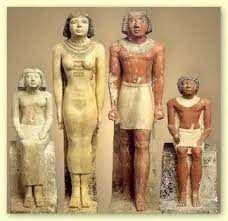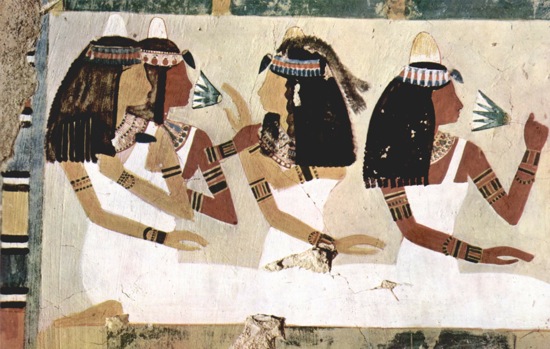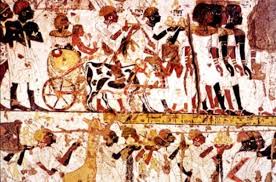Big Triece wrote:Broomstick wrote:As you point out, however, modern racial categories are to some degree cultural constructs, and what traits predominated in a population 10,000 years ago may be quite different than what is seen today.
Not necessarily! Crania analysis from those Nile Valley remains pre-dating the Pre-Dynastic periods also group with modern Sub Saharan African populations. Check the article by Keita on the previous page.
Keita himself says in your videos that cranial information is NOT enough to base a conclusion on! Again, did you pay any attention to those videos before linking to them? Those same crania share characteristics with Asiatic populations that
no one claims are related to Africans! (Or, not related in the time frames we're speaking of - clearly
all humans are related to some degree).
What this means is that the Nile might have been settled by more or less horizontal movement of peoples from a once-fertile Sahara moving east into the valley, preserving a gradation of human coloring that may have been in existence for tens of thousands of years and evolved entirely within Africa.
From what I see in Egyptian art the general skin tone is of a dark reddish brown hue the same reddish brown hue that is seen in modern indigenous Northeast African populations. This conversely coincides with the fact that modern Northeast Africans overlap with early Egyptian crania. There was proven to be a migration from this general region and up the Nile, which coincides with the ancient Egyptians self identified homeland of punt! In my opinion it's pretty cut and dry what the ancient Egyptians looked like:
That only works if you look at art portraying MEN. In Egyptian art women are consistently portrayed in a different color:

This one shows the difference in skin color by gender typical of Egyptian art:

And another one:

And sculpture:

Skin color as depicted in Egyptian are is NOT considered a reliable indicator of
actual skin color because of this sort of color coding.
Of course, with several thousand years of history you'll always find an exception. Here is a multi-colored group of Egyptian women:

And here's one where it looks like the man may be paler than his female companion:

However, the existence of these exceptions in no way invalidates the observation that the vast majority of Egyptian art objects routinely use color coding to indicate gender.
Here is Egyptian art depicting people explicitly identified as Nubians. Note that they are MUCH darker than the depicted Egyptians:

So, despite some real biological similarities which no one here is denying the Ancient Egyptians themselves perceived a difference between themselves and their southern neighbors and had no difficulty depicting them as darker than themselves.
Based on ecological principle they would have been darked skinned due to this fact. Notice that their limb proportions group them with dark brown skinned tropically adapted populations in or from Sub Saharan Africa or in Australia (who were once incorrectly regarded as "negroes" based on their appearance).
Except that “ecological principle” is not a hard and fast correlation. Equatorial South Americans are not nearly as dark as equatorial Africans. Africans natives to equatorial rain forests are often not as dark skinned as those in more arid territories, possibly due to the shade provided by such forests. As noted, the Dravidian populations of India are more closely related to Europeans based on genetics even thought they have “tropical proportions” and dark skin. Apparently, humans can change their colors and limb lengths given sufficient time and selective pressures. Like this Dravidian woman:

The 25th Dynasty is well known to have been ruled by invaders from Kush, now known as Nubia, who were on average darker skinned than the average Egyptian and unquestionably from further south. Thus, an influx of dark skinned African people from the south.
That occupation of Egypt was different from any of the other foreign occupations, because the Nubians didn't see themselves as "conquerors" they along with the Egyptians saw themselves as the rest orators of the old Egyptian ways and customs. As far as "influx" goes, the Nubians returned to Nubia after those events had fallen through.
And... so what? You
seriously think none of those Nubians left offspring behind? That would make them entirely different than any other conquering people in history. Working backward – you're arguing that a group of Nubians who came in and took over by force of arms weren't “conquerors” (which is a bizarre way to look at it, but whatever) and that this is somehow different than all other groups who went into Egypt and took over because.... they're Nubians? Dark skinned? From the South? This does not make sense.
And if you can accept the above, why is it inconceivable to you that the original dynasty-forming event, the uniting of Egypt's Two Kingdoms, couldn't also be different than a conquer-and-displace event?
Funny, from the very first the Egyptians spoke of uniting Upper and Lower Egypt, not Upper taking over Lower.
I never intended to say that they "took over" Lower Egypt, but the fact is that it was Upper Egyptian culture that adopted by the North and became what was Dynastic culture.
And you prove this by linking to videos that, half the time, say the opposite of what you claim they do?
I also find your use of bolding to be interesting, as it slants your quotes to support your position. Let me demonstrate how this can alter emphasis.
YOU bolded thusly:
"While not attempting to underestimate the contribution that Deltaic political and religious institutions made to those of a united Egypt, many Egyptologists now discount the idea that a united prehistoric kingdom of Lower Egypt ever existed."
"While communities such as Ma'adi appear to have played an important role in entrepots through which goods and ideas form south-west Asia filtered into the Nile Valley in later prehistoric times, the main cultural and political tradition that gave rise to the cultural pattern of Early Dynastic Egypt is to be found not in the north but in the south."
But if the bolding changes:
"While not attempting to underestimate the contribution that Deltaic political and religious institutions made to those of a united Egypt, many Egyptologists now discount the idea that a united prehistoric kingdom of Lower Egypt ever existed."
"While communities such as Ma'adi appear to have played an important role in entrepots through which goods and ideas form south-west Asia filtered into the Nile Valley in later prehistoric times, the main cultural and political tradition that gave rise to the cultural pattern of Early Dynastic Egypt is to be found not in the north but in the south."
See – it doesn't change the words, but the emphasis.
Read it without bolding and what you get is that while Lower Egypt might not have been united it still made significant contributions to Egyptian culture, politics, and institutions, and goods and ideas were filtering into Egypt even before written history/dynastic times even if they weren't the greatest influence on Ancient Egypt. In other words, Ancient Egypt was mostly African with a good dash of stuff from elsewhere. Just like most of us here have been saying.
The kinship in particular shows some African elements, such as the king as the head ritualist (i.e., medicine man),
Yes, let's just completely ignore than divine kingship/king as head ritualist is found in Sumer, Babylon, and various other cultures that
aren't African. This is such a common thing in humanity that it does not constitute proof of anything, really.
Someone argued earlier that Egypt's legacy was not found in Africa, this is clearly refuted in the bottom half of the passage from Britannica above. Aspects of the culture of Egypt are to this day still found in inner Africa.
Please provide examples.
The point is, Egypt happily adopted stuff from other cultures and incorporated it into their own. They “Egyptionized” it, just as the US “Americanizes” stuff from other people. Egypt was arguably the first major empire. Like all major empires it doesn't remain “pure” but adopts stuff from other cultures. It's silly to deny evidence of this occurring not only in the First Dynasty but also in pre-Dynastic Egypt. If you want your claim of southern African influences and cultural origins to be taken seriously you can't just throw out evidence of non-African influences simply because they don't fit your pet theory. You have to account for them. There is evidence that Egyptians adopted agricultural products from the Middle East. They became an important part of their culture, and are some of things that set them apart from their southern neighbors. Goats raised in Egypt are still Egyptian goats even if their far distant ancestors came from Anatolia (or some other place near there).
No one denies that they were influenced from the lands that they conquered and were conquered by. Where I am getting at is its origins. It did incorporate Near Eastern livestock into its indigenous foraging system, but some of you all are attempting to just run with it and plop up some lofty conclusion.
Are you having problems reading? How many times do I have to point out that
conquering is NOT necessary to influence a culture, seriously? A hell of a lot of Egypt's contact with its neighbors was peaceful trade.
You held up domestication of indigenous cattle as somehow “proof” they didn't borrow anything from the Levant, but you totally ignored that what Keita talked about in the video you cited was
goats. GOATS. Not cattle. You even admit right in that paragraph just above here that they incorporated Near Eastern livestock yet you continue to claim this somehow didn't affect their culture or civilization. That's just... stupid. Really, there's no other word for it.
One more time – NO ONE is disputing that Ancient Egypt is African, but it is
distinguished from other African groups to a large degree because of non-African influences that were incorporated into the culture. That doesn't make them “not African”, it makes them an early empire. What you're arguing is like arguing that people Rome imported Egyptian wheat to feed its population and imported other Egyptian goods from papyrus to animals to perfumes and precious and semi-precious stones that somehow this made them no longer European.
Afro-Asiatic languages might follow a descent pattern, or they might have arisen simultaneously, or there might even be a mix of the two.
They followed a descending pattern, which is further supported by genetics
Again, the Keita video you cited cautions
against concluding that because there are arrows on a map that these other languages are descendants rather than sister languages. Again, did you even watch those videos?
Keita also says unhesitantly that it did originate in East Africa.
He also states that others have come to a different conclusion while looking at the same facts. Again, did you pay attention to the man you cited in support of your argument?
Using y-hapE alone for proof that the Ancient Egyptians were predominately African isn't sufficient, you need additional supporting evidence.
Why are you acting as though it's the only line of evidence? There is linguistic, cultural, genetic and anthropological evidence that
ALL point to more southerly Northeast Africa as the ancestral homeland of the ancient Egyptians.
But, oddly enough, you don't see pyramids and hieroglyphics in that alleged homeland. They only arise
after these people wind up in the Nile Valley and
after the Valley kingdoms are united and, apparently, with a steady trickle of outside influences dribbling over the whole culture. The origins of Ancient Egypt are IN EGYPT – the people might have migrated in from elsewhere but they built their distinctive culture along the Nile, not in the Horn of Africa.
Why do you keep insinuating that the Upper Egyptians and the Nubians adjacent to them were distinct from one another?
Maybe because the Egyptians themselves seemed so damned sure of it.
They have been proven time and time again to have been biologically the same population. There are countless studies confirming this, they were already a dark skinned population.
Except that even from the First Dynasty not everyone in Egypt came from the south. You
continually discount the existence of the northern Egyptians who, no, were not quite the same as the Nubians and had been there a considerable length of time. They didn't suddenly pop into existence when Narmer/Menes took the throne.
What evidence do you have to suggest that these tropically adapted Africans were "light skinned"? They were found to have been biologically "significantly different" from the Near Eastern populations adjacent to them.
Let me show you some “tropical Africans”:


As I said, both these people come from tropical Africa. They also have distinct differences in skin color, that is, one is “pale” relative to the other. “Pale” is a relative term, not an absolute one. Do you understand this concept now?
I guess you missed the diagram Keita showed of people moving from North Africa into the Nile region.
I couldn't really see any of the ill lit images that were on that projector pad. Nor did I hear Keita mention a migration from "Northern African" into the Nile Valley. What I did hear Keita advocating was a migration from the ancient Sahara into the Nile Valley. Maybe that's what you saw on the projection?
Squint. Seriously, learn to squint. Learn to make the image go to full screen. It's bad enough your videos support your position poorly, a statement like that makes it clear you did NOT pay attention to what was going on in your cite.
You can not determine skin color from a skeleton.
True! What you can find however are the limb proportions of the skeleton. Following ecological principals populations with longer limbs are darker, with the darkest people being tropically adapted. These people were tropically adapted just like populations today who are regarded as "black".
As noted above, even among tropical populations of indisputably sub-Saharan African origin there is a significant
range of skin color. People of “tropical limb proportions” could tend toward
either end of that spectrum.
While “tropical proportions” tend to be associated with dark skin the relationship isn't 100%, any more than the “arctic proportions” are automatically pale skinned
Broomstick that is
"ecological principal"!
“Ecological principal” is not the same thing as a law of physics - “tropical propotions” does not automatically indicate a specific skin shade. As demonstrated by the above photos.
This is what Keita also states in his lecture, that based on that principal they would have been "dark skinned", how dark he said he could not say for sure.
Emphasis added – NO ONE is claiming that Ancient Egyptians were as pale as, say, the modern Irish, but your skeletal data does not prove that they were either the same color or a different color from the Nubians. It is data, but it does not support your claim. Find something else. A dead body with extremely dark skin, for instance – seriously, Egypt is sort of well known for it's well-preserved dead bodies.
It would be naive to think that for whatever the ancient Egyptians would violate these biological laws by somehow being "paler" than the dark skinned populations (whom are regularly referred to as "black") whom they group with above.
“Biological laws” are bullshit as you use them. If the world worked as you claim then everyone at a particular latitude would be the exact same shade. The empirical evidence disproves this. Even among tropical peoples there is a variation in skin color.
There are people in India who are darker skinned than many indigenous Africans. The Dravidians live next to East Asia, they're darker than many Africans, yet their genetics seem most closely related to Europeans.
Tropical limb proportions are not about being "African". It's about the limb proportions of populations around the world that correspond with their environment. It just so happens that most Africans have evolved within the tropic climate zones. For this reason they have tropical limb proportions and dark skin. Some portions of India also lie within the tropics for that reason those populations that evolved there are tropically adapted and have dark skin just like tropical Africans.
And yet there are tropical populations that are paler than either Nubias or Dravidians... so while there is a relationship there it's not as hard and fast as you think it is.
The limb proportions of the ancient Egyptians show them to have tropically adapted limb proportions just like very dark skinned populations around the world including in Africa. Why would they somehow miraculously be able to escape being dark skinned just like the other tropically adapted populations? It makes no logical sense to imply that either the southern or northern Egyptians who are both tropically adapted and group with other tropical population would have pale skin.
Except we have direct evidence that not everyone “tropically adapted” has the same, uniform skin color around the globe. Also, you are completely and stubbornly misunderstanding that I am talking about an influx of genes from a northern group – not enough to “whitewash” the entire population but enough to potentially make Ancient Egyptians somewhat different in skin tone from their neighbors to the south. Rather like how the current president of the US has a skin color intermediate between that of his parents. Rather like how his children, offspring of a woman with a darker skin than his, are not as dark as their paternal African grandparents. No one is going to mistake them for Caucasians, but neither do they look the same as the Kenyan group they are so recently descended from.
You do know that human skin color is controlled by a LOT of genes that mix and match in all sorts of ways, yes?
On top of that, there are Egyptian mummies of pale-skinned redheads dating pretty far back.
Joanne Fletcher actually dismisses the assertion made in the 1970's that mummies like Ramses had red hair. She instead attributes this to Henna die which is commonly used by Northeast Africans. This would make the most since to me as well. How would a man in ancient times that lived until 90's is able to retain solidly red hair throughout his later stages of life? Here is an example of the dye used by some Northeast Africans and that seen in Egyptian mummies:
Yes, dear, I'm familiar with henna.
As for retaining hair color – my paternal grandfather was still more than half dark-haired when he died at 98. My father – still alive in his 80's – has gray sideburns but is still predominately black haired. It is possible for people to retain hair color late into old age, albeit a bit unusual.
However, even in the 1970's people knew you couldn't determine a mummies hair color in life by looking at the mummy. Too many chemicals used in mummification could alter hair color, just as it could alter skin color.
The red hair determination was based on microscopic examination of a hair sample of Ramses the Great as well as testing for the ratio of phealomelanin (the blond to red colors) versus eumelanin (the brown to black colors).
I'll also point out that the determination that Neanderthals had red hair was made by genetic analysis – they had the exact same hair gene as modern Europeans with red hair. This is believed to be a case of the mutation occupying twice, in separate lineages, and not an indication of descent due to the lack of similarity found between the rest of the Neanderthal genome and
H. sapiens.
So, contrary to your assumption, no it's not just based on what things
look like to the naked eye.
I don't know if a genetic analysis has been performed on a sample of Ramses the Great or not. It would no doubt yield interesting data.
None the less even if he was proven to be a red head, what would that prove about the general Egyptian population or the other nobles?
It proves there were actual influences on Ancient Egypt beyond
just the Nubians.

















